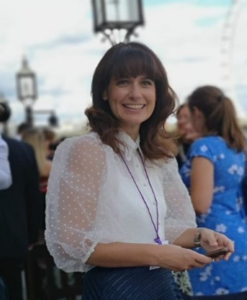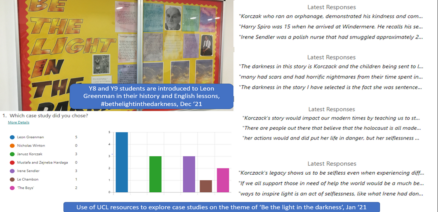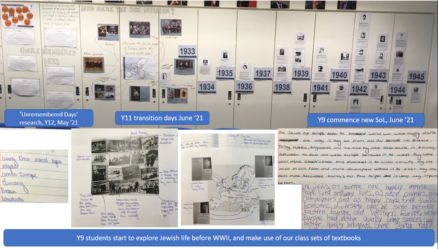 A career in education wasn’t something I contemplated as a young undergraduate of history at University College London in 1996. Initially, I aspired to being a foreign correspondent but, after spending a year studying in Venice, I pursued a career in fine art, antiques and interior design. It was only after volunteering in my own children’s primary school that I realised how rewarding teaching might be. Sharing my passion for history and politics with young people and supporting their formation as active citizens in a global society was an exciting prospect. Having taken the School Centred Initial Teacher Training route into the profession eight years ago, I completed my NQT and RQT years before becoming subject leader for history in 2017. It was during the pandemic, in the summer of 2020 that I came across the work of the Centre for Holocaust Education. One of my colleagues used the online resources from the Centre to support remote delivery of our Holocaust unit to year 9 students. We were committed to delivering Holocaust education but nervous about doing this remotely. Exploring the resources provided by the Centre made us realise how limited our current provision was, but we were also excited by the possibilities offered through the Beacon School programme.
A career in education wasn’t something I contemplated as a young undergraduate of history at University College London in 1996. Initially, I aspired to being a foreign correspondent but, after spending a year studying in Venice, I pursued a career in fine art, antiques and interior design. It was only after volunteering in my own children’s primary school that I realised how rewarding teaching might be. Sharing my passion for history and politics with young people and supporting their formation as active citizens in a global society was an exciting prospect. Having taken the School Centred Initial Teacher Training route into the profession eight years ago, I completed my NQT and RQT years before becoming subject leader for history in 2017. It was during the pandemic, in the summer of 2020 that I came across the work of the Centre for Holocaust Education. One of my colleagues used the online resources from the Centre to support remote delivery of our Holocaust unit to year 9 students. We were committed to delivering Holocaust education but nervous about doing this remotely. Exploring the resources provided by the Centre made us realise how limited our current provision was, but we were also excited by the possibilities offered through the Beacon School programme.
Applying for the programme seemed the perfect opportunity to upskill ourselves in department, and to support the whole school community in integrating Holocaust education across the curriculum for the benefit of all our students. I hadn’t really prepared myself for the impact of the programme on my own professional development. I had wrestled for some time with finding the balance between imparting knowledge and supporting independent enquiry. The Centre’s pedagogical approach, introduced through the superb online ‘Authentic Encounters’ CPD, did just this. Furthermore, it shared the story of Leon Greenman, his wife Else and their beautiful boy Barney. It was through Leon’s story that I recognised the power of personal stories in Holocaust education. It transformed our approach from one of faceless statistics, and a narrow geographic focus, to one which explores the rich tapestry of pre-war Jewish life, the stories of resistance and hope, and the complexities of human nature in considering how the genocide and persecution was possible on such a scale. This approach now underpins much of what we do when planning new schemes of learning elsewhere in our curriculum. The carefully crafted online sessions, and small group tutorials, led by the Centre’s experts, brought me in to contact with other teachers from across the country and it was inspiring to be part of such a vibrant professional learning community. The feedback from mentor Dr Andy Pearce on my scheme of learning was invaluable and challenged me to reimagine the scope and ambition of Holocaust education in my setting. In fact, I found myself rethinking much of what I had considered to be effective history teaching; from source curation and analysis through to the importance of secure chronological knowledge when addressing misconceptions. The primary reason for signing up to the programme was to improve the experience and understanding of our students. In addition to benefitting from our new scheme of learning, accompanying resources, and increased confidence, our students have engaged with wider initiatives, including collaborating with Beacon School alumni on genocide awareness projects, interviewing remarkable survivors of the Holocaust and subsequent genocides, and supporting Holocaust Memorial Day initiatives in school.
In terms of my own career path, the Beacon School programme coincided with the first year of a three-year MA in Applied Educational Leadership at the UCL IoE Centre for Educational Leadership. In December 2021, six months after completing the Beacon School programme, and halfway through my master’s degree, I secured a new role as Assistant Vice-Principal for teaching and learning in another local school. The professional development that I experienced on the Beacon School programme, together with my master’s study, gave me the confidence to apply for a senior leadership role, one which reflects my passion for school improvement through outstanding and innovative teaching and learning. I am excited to embark on this next stage in my career, and look forward to carrying forwards and sharing what I have learnt, and am still learning, from my time with the Centre for Holocaust Education. When I pause to consider that all of this happened during a global pandemic, it demonstrates what is possible in terms of professional and personal growth, both teachers and students, when inspirational and innovative provision is put in place – I can’t thank all the extraordinary professionals at the Centre for Holocaust Education enough for the part they have played in my professional growth.



